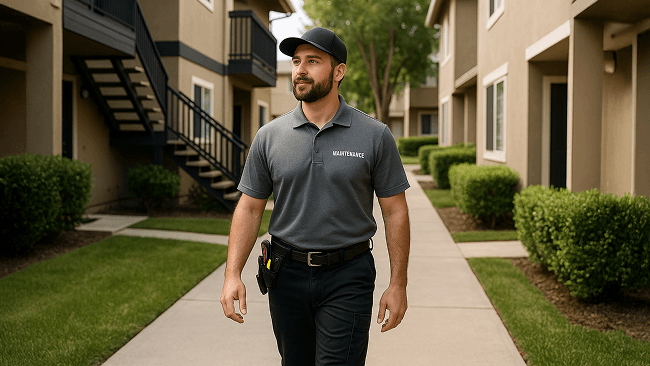Working with Contractors: Tips for Techs
Hello everyone. The next topic is going to be maintenance technicians in the relationship with contractors. As we all know, contractors are extremely important in our industry, and they help us do a lot of the work that needs to be done in our properties. Of course, the maintenance people also are the hands on the properties.
They're the ones who know all the things that happen in such certain properties, and they're extremely crucial as well. But there will be times when maintenance people will be, or the management will be using. Contractors. Contractors come to help and assist us and help us as maintenance technicians.
Sometimes they do work, for example, electrical work that may be a little bit, have more scope of work that we can handle. Or for liability purposes, we maintenance technicians do not want to do or we have been instructed not to do. So that's something that I do. Something that is a normal receptacle, that replacement or something of that nature.
We do, but something major that could be a concern or something that require more, may have more liability or exposure. We have a contractor who come in, like an electrician to come into the worldwide because they're license one. Number two, they're bonded, insured, and at the same time. They know what they're doing compared wise, we do troubleshooting as maintenance technicians, but sometimes there's certain things that even though we know what we're doing, it's better for documentation purposes to have an electrician do this work.
For example, that could be an electrician, it could be a plumber, it could be everybody. There's so many different contractors that we're gonna be working with, but be careful about making sure that we treat them with respect as long equally for them to do the same thing for us. There has to be an ongoing professional relationship between both maintenance people, onsite management, and contractors.
We work as a team, but at the same time, we need to act professional. We cannot go ahead, for example, and have the contractor or you discuss details about certain repairs that have been done. That have more information that we, there's, that the tenant is expected to know. Because sometimes, unfortunately, it can provide misunderstandings.
We have to be extremely careful about that. And there has to be a change of command who's doing the work and who they needs to answer. So in the case of contractors, we need to make sure that the contractors only report their repairs or any feedback back to the on onsite management. That could be the on onsite manager or, anybody else in management or in the, you're being instructed to do to let you know to you as well. But this ongoing communication with tenants where they respond back or a tenant asks a question to a vendor specifically, has to be limited because it could have unfortunate misunderstandings and we don't wanna do that.
And ultimately we are responsible. For directly for any work that needs to be done. So if they have any questions, it's better for them to go ahead and contact management onsite manager and for them to get a better explanation from them instead of any contractor directly. And in your case, act and respect the contractors professionally.
Always do that. Do not engage. For example, if you get into a conflict of some type of situation with a mentor, do not get engaged in any type of behavior. That could be unacceptable. Always acting professional and report it to your supervisors. There's so many things that can happen. A friendship and good communication, not a friendship, but a professional fr a professional friendship to a certain extent can be where the vendor can go.
Long ways. At the same time, our job is to make sure that the contractors are doing their job as suspected because they're getting paid for specific scope of work. Like I said, we are together at the same time. Everybody's responsible for their own repairs and all scope of work. But having a good communication with a vendor can go a long way.
And if there any potential disputes or situation that can escalate unfortunately because of tenant concerns or anything other else, or perhaps using different type of material that was not agreed upon. Anything like that can go back to, back to onsite management so they can go ahead and address that matter.
Communication is the key with your vendors. They're here to help you, but at the same time, both sides, both ours, the maintenance technicians and the vendors have to act and respect one another. I hope this email helps you. I ho this message I help. Sorry. I hope this information helps you and I hope that you continue to continue to educate yourself.




